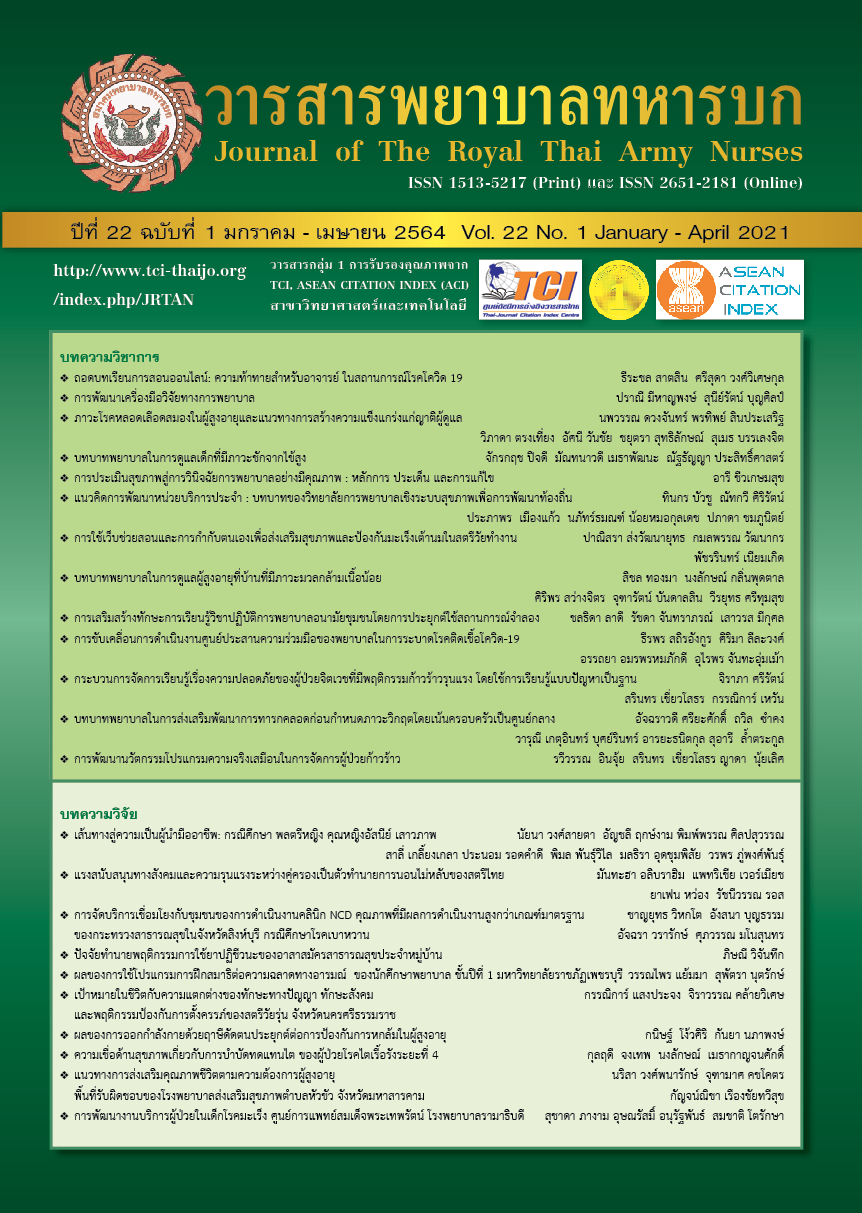Learning Management about Patient Safety in Psychiatric Patients with Violent Behavior by Problem - Based Learning
Keywords:
Patient Safety in Psychiatric Patients with Violent Behavior, Learning Management, Problem - BasedAbstract
Patient safety is very important to patient, their family and staff members. This awareness is a measure of the success in on-going development of standards and qualities in Healthcare services. Therefore, learning management about patient safety in psychiatric patients with violent behavior by problem - based learning in medical and nursing students is building a foundation for learning about patient safety, cultivate attitudes and strengthen the provision of safe service and care for patients. Medical and nursing students place patient safety first awareness in every process of providing healthcare services. Especially the provision of services and care for psychiatric patients with violent behavior. Besides being aware of the safety of the patient. It is also one of the most important to be aware of the safety of service personnel.
Downloads
References
World Health Organization. Patient Safety. Geneva: WHO; 2020.
Phanthusat, N. & Thongyu R. Nursing Practice Guidelines According to Patient Safety Standards. Thai Red Cross Nursing Journal. 2017;10(2): 1 - 13. (in Thai)
Sriyarat, K. Nurses’ roles in management of aggressive psychiatric patients. Thai Red Cross Nursing Journal. 2015;8(1): 43-52. (in Thai)
Department of Mental Health, Ministry of Public Health. Annual Report 2019. Bangkok: Department of Mental Health, Ministry of Public Health; 2019. (in Thai)
Schwappach, B.D., Frank, O., Davis, E.R. A vignette study to examine health care professionals’ attitudes toward patient involvement in error prevention. J Eval Clin Pract. 2013;19: 840-48.
Chaleoykitti, S., Kamprow, P. & Promdet, S. Patient Safety and Quality of Nursing Service. Journal of The Royal Thai Army Nurses. 2014;15(2): 66-70. (in Thai)
Spencer, S. & Johnson, P. De-escalation techniques for managing aggression. Cochrane Database of Systematic Reviews 2016;1:1-14.DOI:10. 1002/14651858.CD012034
Malee Kumkong. Patient Safety: A Guideline to Nursing Practicum. The Southern College Network Journal of Nursing and Public Health. 2019;6(1): 216-28. (in Thai)
Thiangchanya, P., Peeravud, J., Thanapattaraporn, M. & Ramkaew, K. The role of nurses in promoting patient participation in building safety. Songklanagarind Journal of Nursing. 2016;36(3): 247-60. (in Thai)
The Healthcare Accreditation Institute (Public Organization). 2P Safety goal. Nonthaburi: The Healthcare Accreditation Institute (Public Organization); 2018. (in Thai)
Kingkaew, J., Rungruangsiripan, M., Santikunaporn, D. & Julla, N. Perceptions of Nursing Staff on Limit Psychiatric Patients’ Behaviors by Using Physical Restaint. The Journal of Psychiatric Nursing and Mental Health. 2018;32(2): 113-29. (in Thai)
Galyarajanagarindra Institute. Management of patients with violent behavior. Bangkok: Galyarajanagarindra Institute; 2018. (in Thai)
Klomim, K. How to Learning Problem Based Learning: Coursed Design And Development Coursed For Students Teachers. Journal of Graduate Studies Valaya Alongkron Rajabhat University. 2017;11(2): 7-14. (in Thai)
Photong, P., Chansuwan, S., Khachat, S. & Sripho, S. Effect of Problem-based Learning Approach in Nursing Care of Person with Mental Health Problems Subject on Cognitive Skills of Nursing Students. Journal of Phrapokklao Nursing College. 2020;31(2): 73-87. (in Thai)
Puttiwanit, N., Puttiwanit, S., Suwanraj, M. & Kaewmahakam, O. Effect of Problem-Baesd Learning on Intellectual Skills of Nursing Student in Nursing of Persons with Health Problems 1 Subject. The Southern College Network Journal of Nursing and Public Health. 2017;4(1): 1-14. (in Thai)
Boonpleng, W., Norapoompipat, A. & Lumrod, N. Effects of Problem-Based Learning on Course Achievement among Baccalaureate Nursing Students. Journal of Nursing Science. 2018;36(4): 28-38. (in Thai)
Ar-yuwat, S. Problem-Based Learning (PBL): The Challenges of Nursing Education to Foster The 21st Century Learning. Nursing Journal of the Ministry of Public Health. 2017;27(2): 15-30. (in Thai)
Birgili, B. Creative and Critical Thinking Skills in Problem-based Learning Environments. Journal of Gifted Education and Creativity. 2015;2(2): 71-80.
Car, L.T., Kyaw, B.M., Dunleavy, G., Smart, N.A., Semwal, M., Rotgans, J.I., et. Al. Digital Problem-Based Learning in Health Professions: Systematic Review and Meta-Analysis by the Digital Health Education Collaboration. Journal of Medical Internet Research. 2019; 21(2): 1-12.
Downloads
Published
How to Cite
Issue
Section
License
บทความหรือข้อคิดเห็นใดใดที่ปรากฏในวารสารพยาบาลทหารบกเป็นวรรณกรรมของผู้เขียน ซึ่งบรรณาธิการหรือสมาคมพยาบาลทหารบก ไม่จำเป็นต้องเห็นด้วย
บทความที่ได้รับการตีพิมพ์เป็นลิขสิทธิ์ของวารสารพยาบาลทหารบก
The ideas and opinions expressed in the Journal of The Royal Thai Army Nurses are those of the authors and not necessarily those
of the editor or Royal Thai Army Nurses Association.






